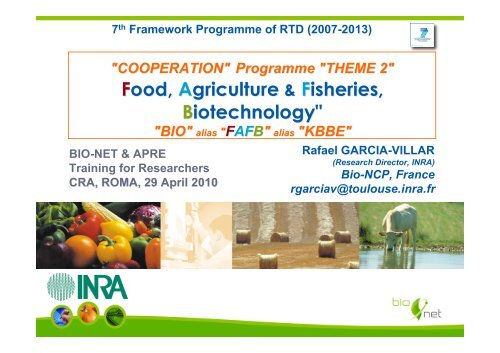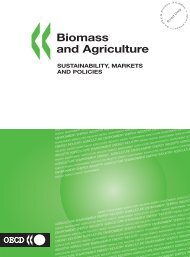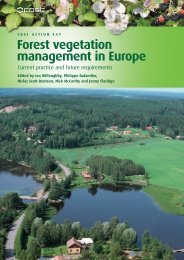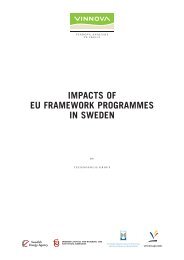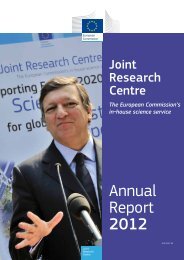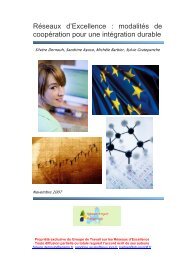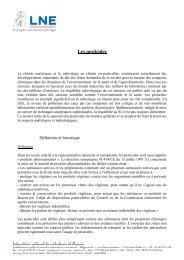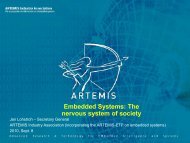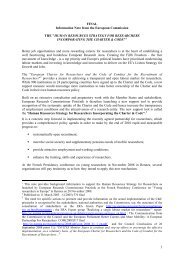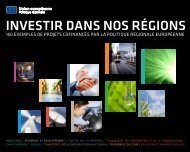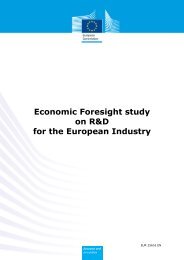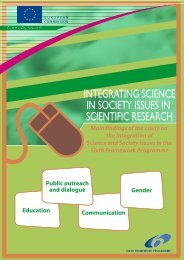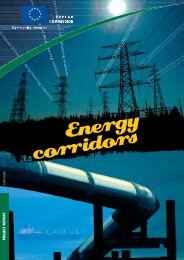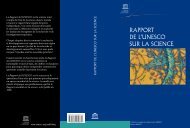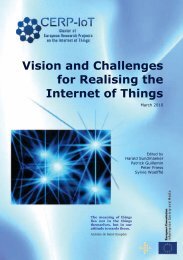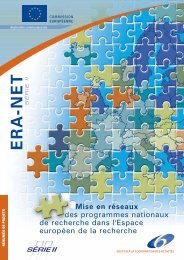KBBE-2011_BioNet Rome_P1-Public - Eurosfaire
KBBE-2011_BioNet Rome_P1-Public - Eurosfaire
KBBE-2011_BioNet Rome_P1-Public - Eurosfaire
You also want an ePaper? Increase the reach of your titles
YUMPU automatically turns print PDFs into web optimized ePapers that Google loves.
7 th Framework Programme of RTD (2007-2013)<br />
"COOPERATION" Programme "THEME 2"<br />
Food ood, , Agriculture griculture & Fisheries isheries,<br />
Biotechnology"<br />
iotechnology"<br />
BIO-NET & APRE<br />
Training for Researchers<br />
CRA, ROMA, 29 April 2010<br />
"BIO" alias "FAF AFB" alias "<strong>KBBE</strong>"<br />
Rafael GARCIA-VILLAR<br />
(Research Director, INRA)<br />
Bio-NCP, France<br />
rgarciav@toulouse.inra.fr
The 7<br />
7 th<br />
Largest research funding programme in the world<br />
Budget over 52 billion euro<br />
Running from 2007 – 2013<br />
Who can apply ?<br />
th Framework<br />
Research groups at universities or research institutes<br />
Companies intending to innovate<br />
Small or medium-sized enterprises (SMEs)<br />
SME associations or groupings<br />
<strong>Public</strong> or governmental administration<br />
International organisations<br />
Framework Programme...<br />
So… you are invited!!
The 7 th Framework Programme...<br />
Focus on Theme 2: FAF AFB B (<strong>KBBE</strong>)<br />
Presentation Outline:<br />
PART PART 1. 1. (± (± 20 20 slides) slides)<br />
The 4 "Specific Specific Programmes"...<br />
Programmes" ...<br />
The 10 "Themes" of the COOPERATION programme...<br />
Focus on the the "Activities Activities" & "Areas" of Theme 2 (<strong>KBBE</strong>…) (<strong>KBBE</strong><br />
PART PART 2. 2. (± (± 20 20 slides) slides)<br />
Indicative "Topics" for the <strong>KBBE</strong>-<strong>2011</strong> Call for proposals"...<br />
proposals"...
Indicative budget<br />
Indicative budget breakdown<br />
for FP7 specific programmes
1. Health<br />
Specific Programme : "Cooperation<br />
" Cooperation"<br />
The 10 "Themes"<br />
2. Food, Agriculture & Fish., Biotechnology<br />
3. Information & Communication Technol.<br />
4. Nanosci. Nanotech. Mat. & New Pro Tech<br />
5. Energy<br />
6. Environment (incl climat changes)<br />
7. Transports (incl Aeronautics)<br />
8. Socio-economic Sciences & Humanities<br />
9. Security<br />
10. Space<br />
6 050 M€<br />
1 935 M€<br />
9 110 M€<br />
3 500 M€<br />
2 300 M€<br />
1 900 M€<br />
4 180 M€<br />
610 M€<br />
1 350 M€<br />
1 430 M€<br />
Total "Cooperation" programme : 32 365 M€<br />
19 %<br />
6 %<br />
28 %<br />
11 %<br />
7 %<br />
6 %<br />
13 %<br />
2 %<br />
4.5 %<br />
4.5 %
Theme 2 :<br />
Food, Food,<br />
Agriculture & Fisheries, Fisheries,<br />
Biotechnology<br />
Objectives<br />
• Build a European Knowledge-Based Bio-Economy (<strong>KBBE</strong>)<br />
• Respond to social and economic challenges:<br />
High quality food and sustainable food production<br />
Food-related disorders (cardiovascular, obesity …)<br />
Infectious animal diseases and zoonoses<br />
Sustainable agriculture/fishery and climate change<br />
Clean biomaterials from renewable bio-resources<br />
• Involve all stakeholders (incl. industry) in research<br />
• Support EU policies (CAP, CFP...)<br />
• Respond quickly to emerging research needs
Theme 2 :<br />
Food, Food,<br />
Agriculture & Fisheries, Fisheries,<br />
Biotechnology<br />
2.1<br />
2.2<br />
2.3<br />
The 3 "Activities " Activities"<br />
Sustainable production and management of biological<br />
resources from land, forest, and aquatic environments<br />
“Fork to farm”: Food, health and well being<br />
Life sciences, biotechnology & biochemistry for<br />
sustainable non-food products and processes
2.1<br />
Areas<br />
Sustainable production and management of biological<br />
resources from land, forest, and aquatic environments<br />
2.1.1 Enabling research on drivers of sustainability of bio resources<br />
micro-organisms, plants and animals, "...omics" technologies, biodiversity, bioactive<br />
molecules, systems biology, bioinformatics, databases...<br />
2.1.2 Increased sustainability, of all production systems<br />
agriculture, forestry, fishery & aquaculture, rural devel, low input & organic agriculture<br />
new technologies, whole ecosystem approach, GM co-existence and traceabilty,<br />
decreasing environmental impact...<br />
2.1.3 Optimised animal health production & welfare<br />
Across agriculture, fish. & aquacult., new breeding methods, exploitation of physiol. &<br />
genetics knowledge, preventing animal disease & zoonoses, vaccines, diagnostics.<br />
2.1.4 Socio-economic research & support to policies<br />
Agriculture (CAP), fishery (CFP), rural development ...<br />
<strong>KBBE</strong> (Knowledge-Based Bio-Economy)<br />
2.1.5 "The Ocean of Tomorrow"<br />
joint call with Themes "Energy", "Environment", "Transport", "SSH"
2.2<br />
Areas:<br />
“Fork to farm”: Food, health and well being<br />
2.2.1 Consumers : Understanding consumers behavior<br />
For competitiveness of food industry ; to determine the impact of food on health<br />
2.2.2 Nutrition : Understanding dietary factors and habits<br />
Prevent diet-related diseases ; Nutrigenomics, interact. nutrition/physio-psycho functions<br />
2.2.3 Food processing : Optimising innovation in EU food industry<br />
Advanced technolgies for traditional food production<br />
Functional food, packaging, by-product & waste management<br />
2.2.4 Food Quality & Safety : chemical & microbiological<br />
Understand links microbial ecology/food-feed safety,<br />
New detection methods, risk assessment, management, communication<br />
2.2.5 Environmental impacts and total food chain<br />
Protecting both human health & the environment<br />
2.2.6 European Research Area<br />
Stregthening cooperation ; support to emerging Joint Programming
2.3<br />
Areas<br />
Life sciences, biotechnology & biochemistry for<br />
sustainable non-food products and processes<br />
2.3.1 Novel sources of biomass and bioproducts<br />
applic. in industry & energy ; genomics & metabolomics for optimized conversion of raw<br />
materials to high added value bio-products ; analysis of farming practices<br />
2.3.2 Marine & Freshwater biotechnology (blue biotech)<br />
marine bioactive compounds & biomass (algae) for industry<br />
2.3.3 Industrial Biotech: novel high added-value bio-products & -processes<br />
novel micro-organisms for industrial use, multi-enzymes<br />
2.3.4 Biorefinery (closed in 2010, reopens <strong>2011</strong>)<br />
biodiesel, biofuels, bioproducts from biomass<br />
2.3.5 Environmental Biotechnology<br />
bio-remediation, eco-efficient industrial processes, waste & byproducts<br />
2.3.6 Emerging trends in biotechnology (closed 2010, reopens <strong>2011</strong>)<br />
bioinformatics, bioinform. infrastructures, synthetic biology
The "<strong>KBBE</strong>" Work-Programme<br />
(A document published every year... approx. 60-90 pages)<br />
The 3 "Activities"<br />
...divided into "Areas"<br />
For each area, a list of "TOPICS"<br />
for the current "Call for proposals"<br />
For each "topic":<br />
number and a title,<br />
description (short but specific),<br />
"funding scheme" (size of project),<br />
specific conditions... (if any in particular)<br />
impact (expected by EC),<br />
Implementation process : publication & deadline<br />
dates, evaluation process, budget, etc.<br />
Available on : www.cordis.europa.eu/fp7<br />
European Commission<br />
... "Find a call"
"Funding Schemes" (type & size...)<br />
FP7-<strong>KBBE</strong>-<strong>2011</strong>-5<br />
Collaborative Projects (...Research...) :<br />
SMALL Collaborative Project "SCP" (
Basic tips…<br />
How to read the Workprogramme<br />
Before rushing into the list of Topics, please read the general<br />
introductory chapters and the headers (i.e. the "philosophy"<br />
behind the <strong>KBBE</strong> concept).<br />
Choose the "ACTIVITY" corresponding to your main interest:<br />
sustainability…, food…, non-food biotechs…<br />
Focus on the "AREA" that fits best with your core expertise…<br />
Look at the "TOPICS" that seem relevant to your research field,<br />
and ask yourself whether you would like to coordinate the<br />
project, or be involved in the project as a partner.
How to read a Topic description<br />
<strong>KBBE</strong>.<strong>2011</strong>.1.3-01: New/next generation of researchers for Neglected Zoonoses at the animalhuman<br />
interface – Mandatory ICPC<br />
Call: FP7-<strong>KBBE</strong>-<strong>2011</strong>-5<br />
This topic focuses of targeted measures aiming at improving the career prospects for young researchers<br />
in the animal – human interface of zoonotic diseases qualified by WHO as "neglected zoonoses".<br />
These diseases pose significant burden / …. / In addition to the scientific aspects of the diseases,<br />
socio-economic, cultural, institutional and decision making aspects should be also addressed with an<br />
integrated and multisectoral approach. Coordination with ongoing EU and international activities in<br />
neglected zoonoses should be envisaged.<br />
Funding scheme: Coordination and Support Action targeted to SMEs. The requested European Union<br />
contribution shall not exceed EUR 2 000 000.<br />
Additional eligibility criteria: Mandatory participation of 4 different ICPC (of which at least 3 from Africa).<br />
Additional selection criteria: SME Coordination and Support Action will only be selected for funding on<br />
the condition that the requested EU contribution going to SMEs is 15% or more of the total requested<br />
EU contribution. This will be assessed during evaluation and checked during negotiations. Proposals<br />
not fulfilling this criterion will not be funded.<br />
Expected impact: It is expected to establish a long-term training programme that is open to promising<br />
young scientists / …. / It should further manage a career development programme to support young<br />
researchers / …. / Breaking barriers and building bridges between animal health and public health<br />
Global challenges: food security, global health, face climate change impact (which has a potential<br />
impact on the prevalence and distribution of some of the neglected zoonoses).
The new call : FP7-<strong>KBBE</strong>-<strong>2011</strong>-5 *<br />
General Call: FP7-<strong>KBBE</strong>-<strong>2011</strong>-5<br />
<strong>Public</strong>ation : ± 30 July 2010<br />
Deadline : ± 25 January <strong>2011</strong><br />
1-Stage evaluation<br />
Joint/Coordinated Calls<br />
FP7-OCEAN-<strong>2011</strong><br />
•<br />
ERA-NET Call<br />
Workprogramme <strong>2011</strong><br />
FP7-ERANET-<strong>2011</strong>-RTD<br />
(Budget Budget <strong>2011</strong>)<br />
Provisional<br />
Budget<br />
± 272 M€<br />
Act. 2.1 (sustainable prod.) : ± 100 M€<br />
Act. 2.2 (food, health...) : ± 70 M€<br />
Act. 2.3 (biotech, non-food) : ± 65 M€<br />
Act. 2.4 Other Activities : ± 5 M€<br />
( ± 240 M€)<br />
+ OCEAN : ± 14 M€<br />
+ ERA-NET : ± 10 M€<br />
+ General activities : ± 3.1 M€<br />
+ Other actions : ± 5.5 M€<br />
* Indicative values & dates<br />
(± 32 M€)
How to improve our success rate ?<br />
Do not stay alone - do not "cultivate" secrecy - get help<br />
Look for synergies - in your country & the rest of Europe<br />
Take the "Leadership" - whenever possible<br />
• Co-ordination of the project, or ...<br />
• work-package leader (presence in the management group…)<br />
Remember :<br />
Your project shall answer as comprehensively as possible to the whole<br />
description of the topic written in the Workprogramme.<br />
Be "reader-friendly" : proposal written in a clear and legible fashion (avoid<br />
jargon, evaluators are not specialists…)<br />
Evaluation of proposal : 3 criteria (ranked 0 to 5)<br />
Scientific and/or Technological Excellence<br />
Quality of consortium and management<br />
Potential Impact (...exploitation of results)<br />
Give them what they want !!!
What else can we do ?<br />
Contribute to future workprogrammes (suggest new topics...)<br />
Collaborate with Programme Committee delegates and<br />
stakeholders groups in your country (lobbying…)<br />
Participate to ETP's working groups (implementation...)<br />
Apply for nomination to ad-hoc committees (EURAB, Euragri,<br />
SCAR, EFSA, Joint Programming...)<br />
Volunteer to be an evaluator (EC experts database)<br />
https://cordis.europa.eu/emmfp7/
Italian NCP: APRE<br />
Last but not Least : Get Help !<br />
Ms. Chiara Pocaterra <br />
Mr. Gianluca Rossi <br />
NCPs in Other countries:<br />
Check CORDIS<br />
http://cordis.europa.eu/fp7/ncp_en.html<br />
Select country and BIO (<strong>KBBE</strong>)<br />
The Bio-Net web pages:<br />
http://www.ncp-bio.net<br />
End of PART. 1


